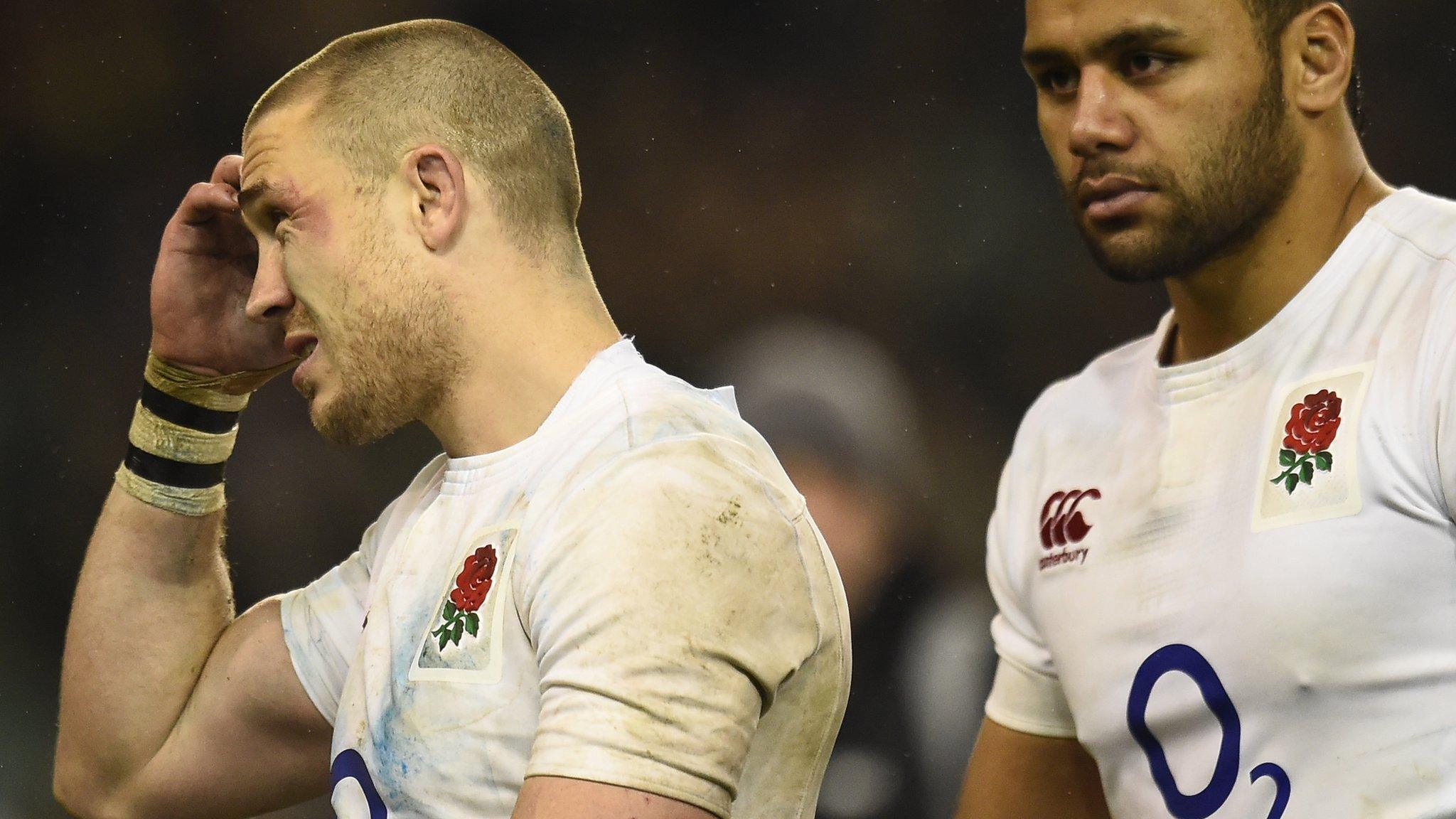Six Nations 2017: Echoes of the past as Ireland dash English hopes once again
- Published
- comments
Knowing that a tornado is coming your way doesn't mean it won't blow your house down.
Once again England came to Dublin with a Grand Slam in their sights. Once again they were overwhelmed by an Ireland team playing with a pace and intensity they could not match. A team of champions engulfed in unfamiliar panic, a side untouched in 18 matches turned over by one unbeaten at home for three rollicking years.
England have made unprecedented strides under Eddie Jones, been transformed from the nearly-men of the Six Nations and the never-weres of the 2015 World Cup to back-to-back title winners and joint world record holders.
This soggy Saturday evening exposed just how far they might still have to go. Jones, his ultimate target the next World Cup in 2019, had wanted to see what his side were like under World Cup-like pressure. The answer was as clear as the skies overhead were murky.
All great teams have phases of development. The All Blacks that won their home World Cup in 2011 had processed the lessons of their own shortcomings four years earlier, when a sudden collective brain-freeze had done for them against France in Cardiff.
England's champions of 2003 held strong in the last critical moments of extra time in Sydney in part because they had failed to do so at Lansdowne Road, Murrayfield and Wembley in decisive battles that came before.
Maybe this England side will be the same. Better for it to happen here than in Japan in three years' time, came the co-ordinated message afterwards.
That's the hope, for the white-shirted supporters who came across the Irish Sea with great expectations and left with familiar regrets, if not always the logic.
There is no golden sporting treaty that painful defeats must automatically be followed by redemptive triumphs. England's team that won a title but lost a Slam in Ireland six years ago, external stumbled out of the World Cup in the quarter-finals five months later, undisciplined and unloved. The side that went to Cardiff in 2013 with the same clean sweep in their sights were taken apart that night and then collapsed again in the crunch contests in the ill-fated autumn of 2015.
For all that Jones has done, for all those wins that piled up, this was a chastening way for his own first epoch to close.
*both New Zealand and England's 18-Test winning runs were ended by Ireland
The 2013 loss in Cardiff, Dublin defeats of 2011 and 2001,, external and the Slam successes in Paris a year ago and here in Dublin in 2003,, external all illustrated how important it is to win the opening exchanges of these deciders. It sets the tone. It quietens the crowd. It calms your fears and sets doubt loose among your opponents.
Mike Brown comfortably caught the first two high balls, aimed his way, his opposite number Jared Payne spilling the first of his. That was as good as it got for England.
Twenty minutes in, Ireland had almost 75% of both territory and possession. England were playing as if in a daze, second best at the breakdown, slow with ball in hand, caught out by a plotline we have all seen several times before.
Ireland, two defeats in four coming into this, were ferocious, relentless, fast up out of defence, all teetering kicks and battering runs. Of course they were. It's how they were in 2011 and 2001, how they were always going to be when an English party is there to be pooped.
It had rained all morning. It blew all day. Everyone saw the tornado coming.
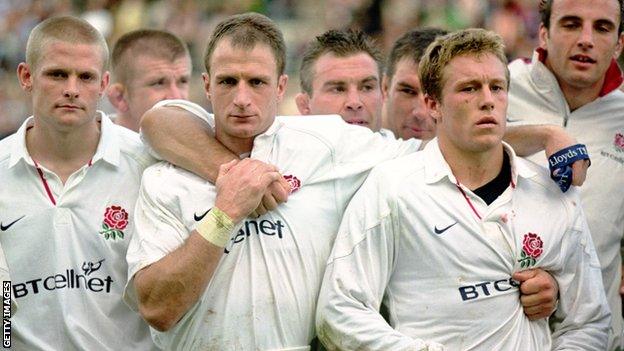
Future World Cup winners Mike Catt and Jonny Wilkinson were in the England team that lost a Slam bid in Dublin in 2001
And yet England could do little about it, in that opening quarter, as knock-ons followed burgled line-outs followed kicks put out on the full. In the closing moments, when they were still within four points and had an attacking line-out on the Irish 22, man of the match Peter O'Mahony stole it from Maro Itoje's fingertips. At the death, Brown spilt the final pass in the championship's final seconds.
Too many of their big hitters were unable to get off the ropes: Itoje and Billy Vunipola nowhere close to their buccaneering best, their ball-carriers too often taking the ball stationary and unable to dent the gain-line, the George Ford-Owen Farrell axis starved of quick ball and precious time.
Only when Farrell's hurried pass hit Brown on his right shoulder with Elliot Daly overlapping down the left at the very start did they look like scoring a try. Only when Jones threw on his finishers did they gather any momentum, and familiar old memes like the Irish choke tackle and grubber kick soon slowed that down to an exhausted crawl.
It has been a chaotic championship. Scotland beat Wales, who beat Ireland, who beat England, who beat everyone else. It is arguably tighter in this oldest of competitions than ever before; take a punch-drunk Italy out of it, and the only away win in the competition was England's late, late show in Cardiff.
England should still have anticipated the green-shirted bedlam that came their way on Saturday. They should also have coped with it better when it blew in and found solutions more quickly than they did.
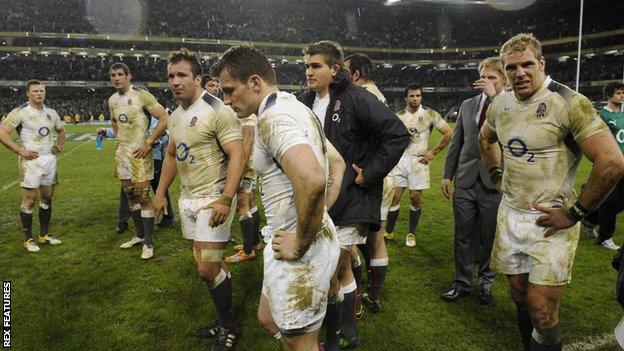
England saw another Slam bid ended in a wet and windy Dublin 2011
"In a World Cup you have to win seven games in a row," said Jones afterwards. "You have to deal with teams coming at you. That was like a World Cup final out there, and we weren't good enough."
Jones, as canny as they come, will use this defeat to drive his charges on. While he was quick to take responsibility in public - "I didn't prepare them well enough, I'll prepare them better next time" - behind closed doors he will be brutally honest about what must come next.
The All Blacks side whose record-breaking run was ended by Ireland in Chicago in November have continued to develop despite that reverse. A few days later they gained rapid revenge over Joe Schmidt's men; should the rumoured rejig of this autumn's fixtures come off, a game against New Zealand will provide the next benchmark for the Jones project.
"We're all human beings, we're not perfect," said the Australian, still grinning the same laconic grin that has greeted win after win and now a first defeat.
"We're 14 months into a four-year project. Realism shows us we still have a lot to do. We'll have more setbacks on the way to the World Cup.
"We're batting at a pretty good average. Even [legendary Australia batsman] Don Bradman got a zero in his last Test. It's not the end of the world."
Not the end of the world, but the end of something special, even if it could also be the start of something even bigger.
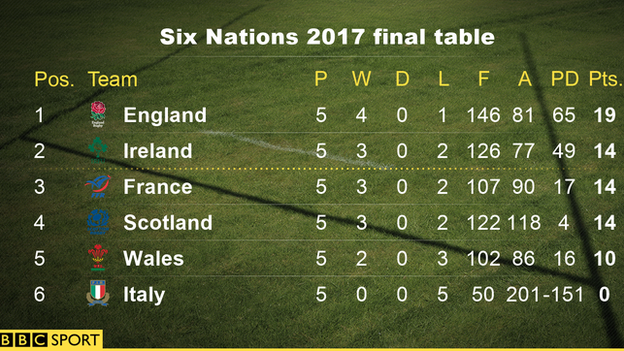
Despite three wins, Scotland had to settle for fourth place on points difference
- Published19 March 2017
- Published18 March 2017
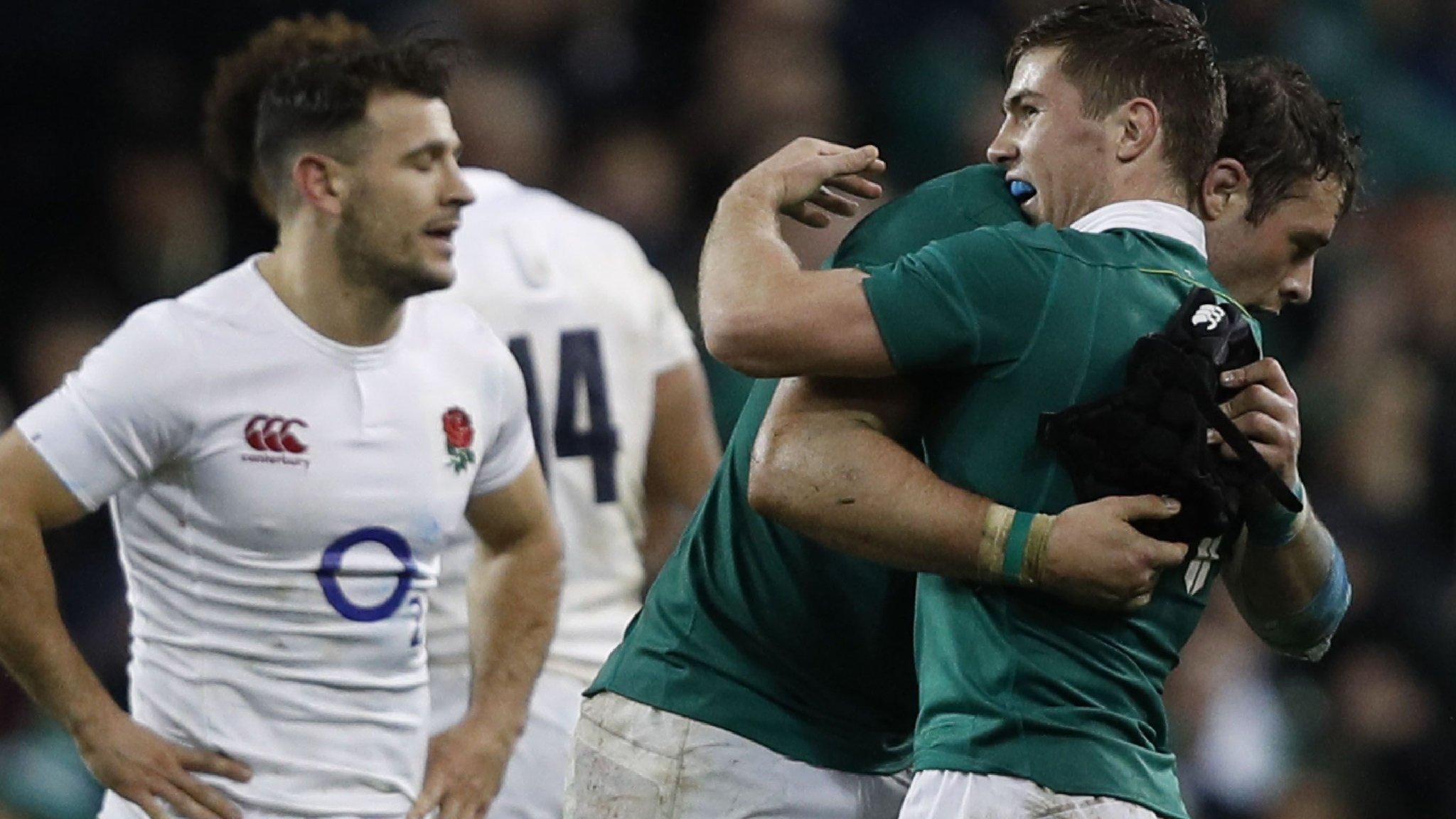
- Published18 March 2017
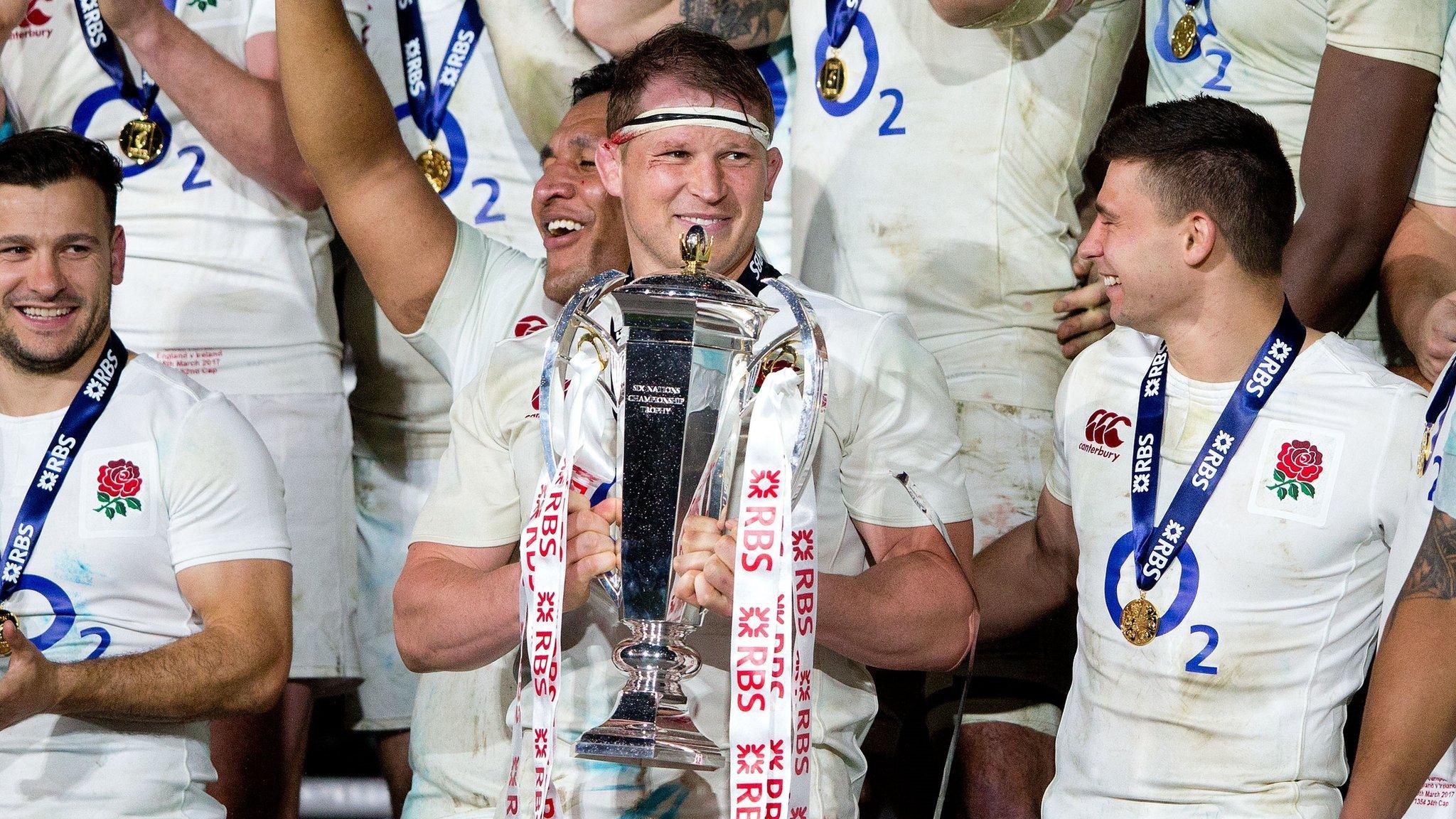
- Published18 March 2017
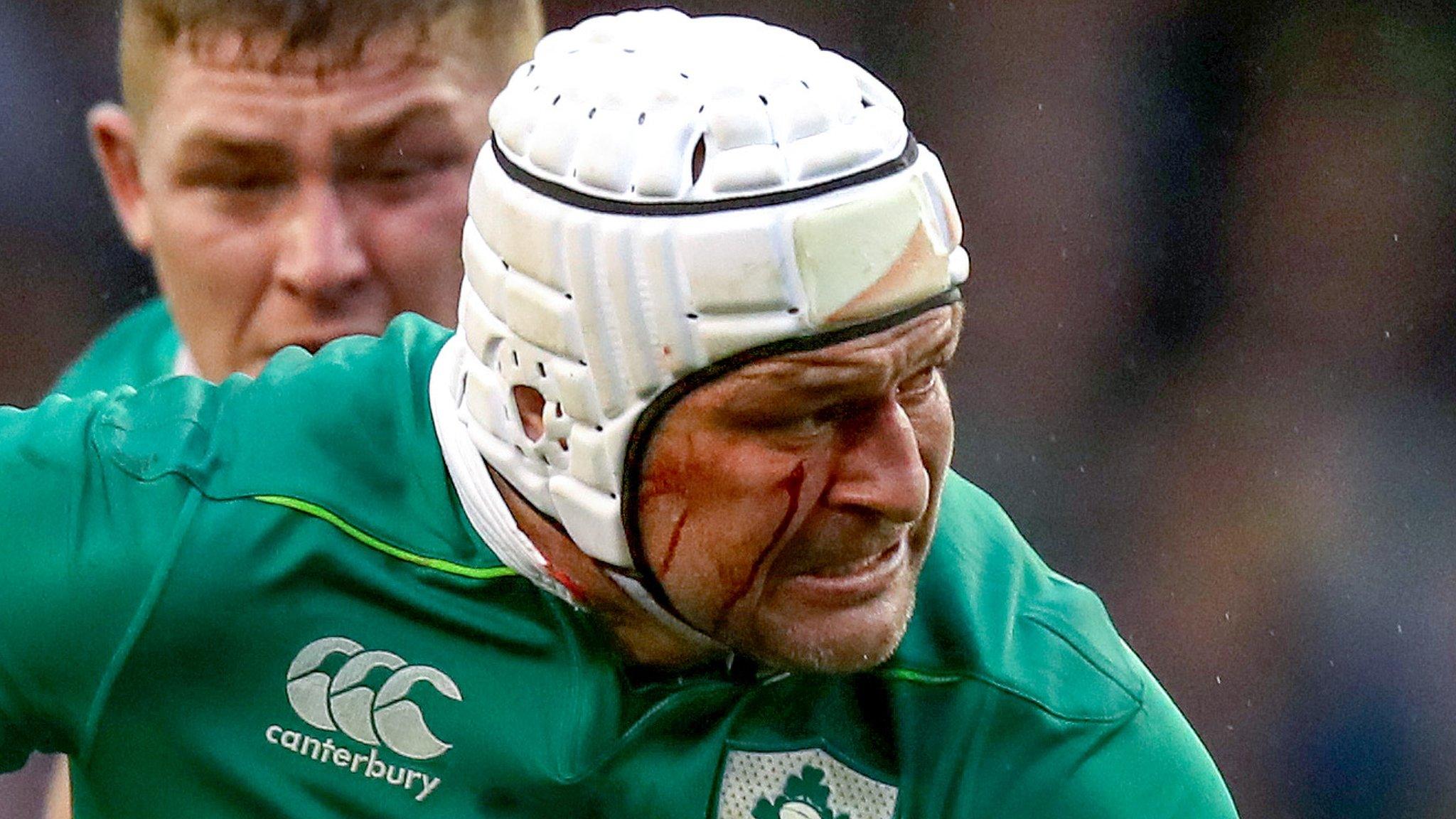
- Published18 March 2017
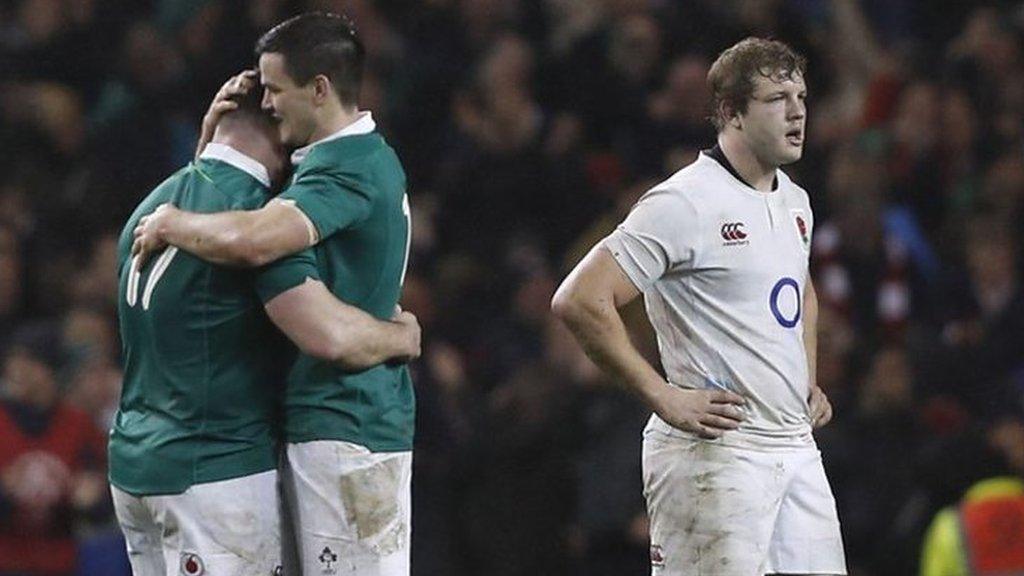
- Published15 March 2017
